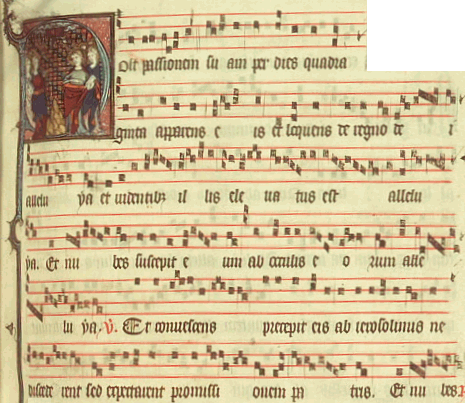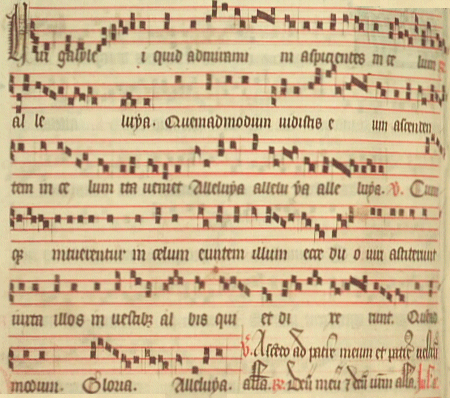Even Years: Augustine of Hippo, Sermon on the Ascension, 1-2 (PLS 2, 494-495
Hodie Dominus noster Iesus Christus ascendit in caelum; ascendat cum illo cor nostrum.
Audiamus Apostolum dicentem: Si consurrexistis cum Christo, quae sursum sunt sapite, ubi Christus est in dextera Dei sedens; quae sursum sunt quaerite, non quae super terram. Sicut enim ille ascendit, nec recessit a nobis, sic et nos cum illo ibi iam sumus, quamvis nondum in corpore nostro factum sit quod promittitur nobis.
Ille iam exaltatus est super caelos; patitur tamen in terris quidquid laborum nos tamquam eius membra sentimus. Cui rei testimonium perhibuit desuper clamans: Saule, Saule, quid me persequeris? Et: Esurivi, et dedistis mihi manducare.
Cur non etiam nos ita laboramus in terris, ut per fidem, spem, caritatem, qua illi conectimur, iam cum illo requiescamus in caelis? Ille, cum ibi est, etiam nobiscum est; et nos, cum hic sumus, etiam cum illo sumus. Illud ipse et divinitate et potestate et dilectione; hoc autem nos, etsi divinitate non possumus sicut ipse, dilectione tamen possumus, sed in ipsum.
Ille de caelo non recessit, cum ad nos inde descendit; nec a nobis recessit, cum in caelum rursus ascendit. Nam quia ibi erat, cum hic esset, ita ipse testatur: Nemo, inquit, ascendit in caelum, nisi qui de caelo descendit, Filius hominis, qui est in caelo.
Hoc dictum est propter unitatem, quia caput nostrum est, et nos corpus eius. Hoc ergo nemo, nisi ipse, quia et nos ipse secundum id quod ipse Filius hominis propter nos, et nos Dei filii propter ipsum.
Ita quippe Apostolus dicit: Sicut enim corpus unum est, et membra habet multa; omnia autem corporis membra, cum sint multa, unum est corpus, ita et Christus. Non ait: ita Christus, sed ait: ita et Christus. Christus ergo membra multa, unum corpus.
Descendit itaque de caelo per misericordiam, nec ascendit nisi ipse, cum et nos in ipso per gratiam. Ac per hoc non nisi Christus descendit, nec nisi Christus ascendit; non quod capitis dignitas confundatur in corpore, sed quod corporis unitas non separetur a capite.
Odd Years: Augustine of Hippo, Treatise 10 on 1 John, 9 (SC 75, 432-436)
| Dominus ergo noster iesus christus ideo ascendens in caelum die quadragesimo commendauit corpus suum qua
habebat iacere quia uidit multos honoraturos se quia ascendit in caelum, et
uidit quia honor ipsorum inutilis est si conculcant membra ipsius in terra. et
ne quis erraret et cum adoraret caput in caelo, calcaret pedes in terra, dixit
ubi essent membra ipsius.
| At his ascension into heaven on the fortieth day, our Lord Jesus Christ commended to the world the body in which he would remain here below. He did this because he saw that many people would honour him on account of his ascension, but that such honour would be worthless if they were trampling on his members on earth. He wished to forestall the error of worshipping him as head in heaven and at the same time trampling on his feet on earth, and so he indicated where his members were to be found.
| | Ascensurus enim dixit uerba
nouissima; post ipsa uerba non est locutus in terra. ascensurum caput in caelum
commendauit membra in terra, et discessit. iam non inuenis loqui christum in
terra; inuenis illum loqui, sed de caelo. et de ipso caelo quare? quia membra
calcabantur in terra. persecutori enim saulo dixit desuper: saule, saule, quid
me persequeris? 'ascendi in caelo, sed adhuc in terra iaceo. hic ad dexteram
patris sedeo; ibi adhuc esurio et sitio, peregrinus sum'.
| As he was about to ascend, he spoke the last words he was to utter on earth. At the moment of going up to heaven, the head commended to our care the members he was leaving on earth, and so departed. No longer will you find Christ speaking on earth; in the future he will speak from heaven. Why will he speak from heaven? Because his members are being trampled underfoot on earth. He spoke to Saul the persecutor from above, saying: 'Saul, Saul, why are you persecuting me? I have ascended to heaven, but I still remain on the earth. Here at the Father's right hand I sit, but there I still hunger and thirst and am without shelter'.
| | Quomodo ergo corpus commendauit
in terra ascensurus? cum interrogarent illum discipuli: domine, si in hoc
tempore praesentaberis, et quando regnum israhel?, respondit iturus: non est
uestrum scire tempus quod pater posuit in sua potestate, sed accipietis
uirtutem spiritus sancti superuenientem in uos et eritis mihi testes. uidete
qua diffundat corpus suum; uidete ubi se calcari non uult: eritis mihi testes
in hierusalem et in totam iudaeam et samariam et usque in totam terram. 'ecce
qua iaceo qui ascendo. ascendo enim quia caput sum; iacet adhuc corpus meum.
qua iacet? per totam terram. caue ne percutias; caue ne uioles; caue ne calces.
nouissima uerba christi sunt ista ituri in caelum
| In what way, then, did Christ commend to us the body he was leaving on earth at the moment of his ascension? When his disciples asked him: Lord, has the time come for you to reveal yourself, and when will the kingdom be restored to Israel? his parting words were: It is not for you to know that time which the Father has reserved to his own authority, but you will receive power when the Holy Spirit comes upon you, and you will be my witnesses. Observe the area his body is to cover, mark the places where he is loath to be trampled underfoot: 'You will be my witnesses in Jerusalem and in the whole of Judea and Samaria and to the ends of the earth. That is where I remain on earth even when I ascend to heaven. I ascend because I am the head; my body still remains.' Where is it? Everywhere, to the ends of the earth. Take care not to strike it or violate it or trample it underfoot. These are Christ's last words at the moment of his departure for heaven
| | Fratres, cogitate uisceribus
christianis. si heredibus tam sunt dulcia, tam grata, tam magni ponderis uerba
ituri in sepulchrum, heredibus christi qualia debent esse uerba nouissima non
redituri in sepulchrum sed ascensuri in caelum? namque ille qui uixit et
mortuus est - rapitur ad alia loca anima ipsius, corpus ipsius ponitur in
terra. an fiant illa uerba an non fiant non ad eum pertinet. iam aliud agit aut
aliud patitur. aut in sinu abrahae gaudet aut in igne aeterno aquae modicum
desiderat. in sepulchro autem ipsius iacet cadauer sine sensu, et custodiuntur
uerba nouissima morientis. quid sibi sperant illi qui uerba nouissima sedentis
in caelo non custodiunt uidentis desuper an contemnantur an non contemnantur,
illius qui dixit: saule, saule, quid me persequeris?, qui seruat ad iudicium
quidquid uidet pati membra sua?
| My friends, you have Christian hearts. Think, then; if the words of one who is on the way to the grave are so sweet, so precious, so important to his heirs, what must the last words of Christ mean to his heirs as he departs, not for the grave but for heaven! When a person has lived and died his soul is borne away to another place while his body is laid in the ground. Whether his last request is carried out or not, it matters little to him now. He has other things to do or suffer. His corpse lies in the grave, feeling nothing. And yet his dying wishes are carefully obeyed! If that is so, what will be the lot of those who fail to observe the parting words of the one who is seated in heaven and who looks down to see whether they are flouted or not - the words of him who said: Saul, Saul, why are you persecuting me? and who reserves for the Day of Judgement all that he sees his members suffer?
|
|
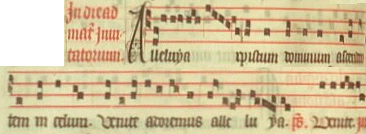
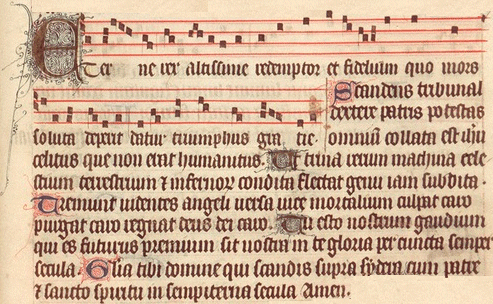
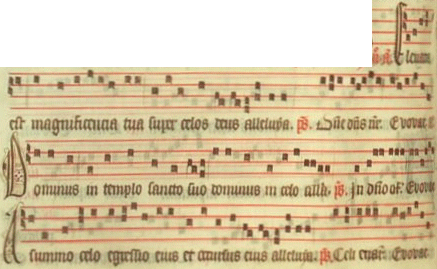


 Psalm 68: Hebrew English Then BACK
Psalm 68: Hebrew English Then BACK
